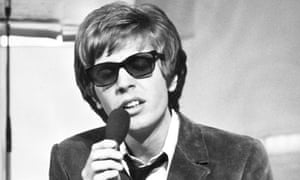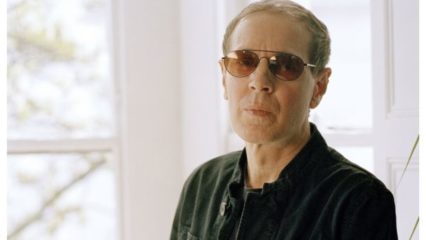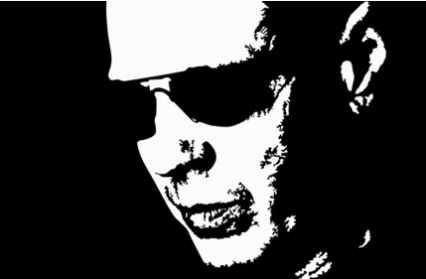In tribute to Scott Walker, who has died aged 76, we dig out from the archive Gary Raymond’s 2012 article on Walker’s career and significance as what was to prove his final studio album Bish Bosch was about to be released. The article reaches from Walker’s days as a 1960s heartthrob crooner pop icon, through his “wilderness years”, to his late period of terrifying avant-garde.
I remember the day I bought Scott Walker’s last studio album very well indeed. I spent a few hours spread supine on the floor amidst my speakers, nauseous and worried, shocked and battered. It was The Drift that had done it to me. I could not bring myself to play it a second time for several years. I should have been prepared for the blow that awaited me when I bought that album on the day it came out in 2006, but the truth is, no amount of preparation can prepare you for a new Scott Walker album.

It has become common to misunderstand the chapters of the career of Scott Engel (Walker’s real name – none of the Walker Brothers were called Walker). It is true that for a brief period the Walker Brothers official fan club had more members than that of the Beatles, but Engel’s baritone croon was always an oddity when placed in the centre of the pop ballads that made his group sixties icons and Engel himself a heartthrob. His solo records of the late-Sixties seemed to hit a balance between the extremely dark and grubby subject matter and allusions to surrealist masters and the obvious pop nous that had created so many hits for the Walker Brothers. But looking back, as his new album Bish Bosch is released on Monday, the pop sensibility obliterated, it is the darkness of these solo records that maintain the link to Engel now; Engel the avant-garde conceptual composer.
In the Seventies, he lost his way and produced healthy sales figures with completely forgettable mainstream records. Engel has spoken of finding it hard to give up the life, the mantle of a pop star, while at the same time experiencing the corrosive depression of a man who knew he needed to be following his creative impulses. And Engel’s true form, we know now, has no interest in pop music.
After yet another brief reunion with the Walker Brothers for the underrated and misunderstood Nite Flights (1978) album – so the story goes – he became a recluse, a myth. Climate of Hunter (1984), his only eighties output, was famously rumoured to be the lowest-selling album in the history of Virgin Records. And then in 1995 he raised his head from the dunes once again and released the industrial carnage that is Tilt. I was in an office job when a colleague played me Tilt. Not even the sweeping-but-jagged keyboard sections and cracked light of melodious mnemonics could help me with it. Some albums are difficult. Tilt was somewhere out in the wilderness, rattling its pagan rain sticks at the twelve-bar blues. Tilt offended me, upended my belief system. I walked away from it. Some years later, having returned to Scott Walker through my investiture in the grubby hands of bohemian chanteurs such as Gainsbourg and Brel, I began to follow the apparently baffling career of Engel chronologically. And this was how I began to understand him and the significance of his music.
Scott Engel became Scott Walker and his band The Walker Brothers were one of the most successful groups of the mid-Sixties. When they broke up, Engels released four solo records that not only boasted some hits but a startling development in his own writing style. He covered Jacques Brel, revelling in tales of dockland prostitutes and mutated heroin addicts as he smattered them in rousing brass tumults and Cuban-heeled bohemianism. His first encounter with musical failure was Scott 4 (1969), which was his fifth solo album and easily his most important work of this first period. It sunk miserably, strangely, as it is a natural progression from the popular albums that went before. Engel’s dark themes were more prominent than ‘below the surface’ as some commentators still like to suggest. At their quietest, they are skags in a Persian rug. Engel’s solo work from this period finds fine cinematic companions in the dust storms of Sergio Leone, the crazed avant-garde debauchery of Jodorowski, the monochrome surrealism of Bergman’s The Seventh Seal (1957) and Hour of the Wolf (1968). The fact that he croons, and melodically he is still toying with pop turns and instruments, seems to have fooled a great many people into thinking the first four of his solo records were mainstream fodder. He had been found out by Scott 4. That’s where his personal and artistic journey to where he now really begins; with the commercial failure of that record.

In the Seventies, Engel found that his relationships with his fans and his record company would force him into decisions he does not look back on with much fondness. He has spoken recently of a no-man’s-land, a time when he made records he did not want to make in order to stay in the game. There are some not so terrible Walker Brothers reunion albums from that decade, but he is right when he says that they are meaningless, and do nothing for his reputation. No Regrets (1975) and Lines (1976) are playing more to the fans of Bread than the dark bohemians Engel was singing to (even if his actual audience was a little more mainstream than that) with his solo records of the previous decade. But much of the primaeval darkness in which Engel now works ( as evident on Bish Bosch, a step even further into the wilderness than The Drift) comes from the pupa he was kept in during this decade, his demons wrestling into the deepest pits as he tried to find a way to make the music he wanted to make. Engel’s journey is something akin to that of William Hurt in Ken Russell’s Altered States (1980); the story of a good-looking maverick scientist who, through a series of dangerous experiments, sends himself back to encounter man’s origins within his own physiognomy.
If Scott 4 was the point when Engel found his subject matter and the space in which to explore it, then the second turning point was Nite Flights (1978), where he began to discover his sound. It is a Walker Brothers record in name, and in personnel, but it is a stark, electronic, Berlin-Esque experience. Fans of David Gates have no place here. Engel was pulling the music back closer to the sound in his soul, and he was beginning to have a vision as a composer. Still, the next step was a while coming. His vocal style is, by the time of Climate of Hunter six years later, taking those steps founded on Nite Flights, is on the journey toward that Munchian drawl, that low deathly, stretched, crooner-in-hell groan that he has made as much a barbaric tool as the other instruments that shatters across his soundscapes. The Climate of Hunter is a grey record, suitable for listens in damp multi-storey car parks. Tilt, which came eleven years after it, has left urban greyness behind, and lives on the edges of the blackest volcano.

I realise now that Tilt is a magnificent statement in conceptual composition, and is perhaps Engel’s most rounded piece of work. Still, some of the keyboard sounds, and some of the melodic right angles have dated. The Drift (2006) will not date. But Engel is trying to get somewhere where that question will not even be relevant. As he uses hammering hides of beef as percussive beats on The Drift, he also has written some great riffs, and some arresting narratives involving Brel-like characters. ‘Cossacks Are’ is still rooted in cinema. As the black shadow of Bish Bosch makes itself known, there are suggestions that Engel is still moving away from these shores. I may end up on my back again, gasping for breath, but this time I’m prepared and I look forward to the palpitations.
The Five Points of Scott Walker.
Scott 4 (1969)
One of the most striking albums of the late-Sixties, filled with surrealist Bergman narratives, meditations on death, quotes from Camus, and lingering minor chords in rich string sections. In ‘Boy Child’ he gives us a timeless, almost biblical dreamscape, a nativity lullaby for the Cold War generation. In ‘Duchess’ he proves he is capable of writing anything to rival Dylan’s most reserved and beautiful songs; it would sit neatly at the end of John Wesley Harding, and yet lyrically it is Blakean, swirling, fiery. Scott 4 is an epic album at 33 minutes, in much the same way as Dylan’s Old Testament Appalachian folk record is, released the year before. It is one of the most profound musical statements of that decade from either side of the Atlantic.
Nite Flights (1978)
An album split between the three Walker Brothers, it is the first four tracks, penned and sung by Engel, that marks the first turn in the road for what was to become his modern sound. The layered vocals of ‘Shoutout’ would return in subsequent albums; the ghostly electrified curl of his delivery would do much to enhance the darkness of the sound underpinning the disjointed, manic lyrics. ‘Electrician’ is a track so influential and sprawling it is deserving of an essay all of its own. There is Bowie here, in swagger, in inventiveness, and in the sharp stabs at rocking. The Engel influence on the sound of the album sounds deeply influenced by Bowie’s Berlin period with Eno, but most striking are the patches that bring Bowie’s 1980 album Scary Monsters to mind. And it was Bowie who would go on to cover the title track of Nite Flights on his 1993 Black Tie White Noise.
The Climate of Hunter (1984)
Although Engel released a glut of albums in the Seventies, between the 1970’s ‘Til the Band Comes In and 1978’s Nite Flights, he had released no new self-penned material. So it is perhaps less of a shock in that context that his next album came in 1984 and sounded as if Nite Flights had come out only yesterday. It is a damnably grey extension of what he started on the last Walker Brothers record. It is nightmarish mostly, but it also has the tendency to kick off tracks in ways that may prepare the listener for some Prince-like synth-funk. However, the soul of the album is more Godspeed You! Black Emperor than Quincy Jones. Dated a little now with its swirls of fretless bass and electric drums, it is still a harrowing listen and seems to take a morbid pleasure in wrong-footing the listener.
Tilt (1995)
Tilt opens with an ominous operatic refrain, and from that moment Scott Walker is a fully opened bud, an ink-black rose. From the moment ‘Farmer in the City’ begins its throbbing, delicious homage to Sibelius-Esque panoramas we are in the company of a visionary composer, about as far from the idol of Ready Steady Go! as anyone has managed to move. In the opening track alone Engel is casting a bleak futuristic drama from the stuff of Puccini, Gorecki and Elgar. But he is also remaining true to his cinematic preoccupation as well as drawing in the most interesting of contemporary influences: there is as much Peckinpah and Morricone in ‘Bolivia ‘95’, for instance, as there is Trent Reznor and the Pixies. Tilt is a shuddering skyscraper of a record, one that bends in the wind but will not come down, and compared to the next studio album he made, it is a mainstream gem.
The Drift (2006)
Opening with the cruel downturned jagged guitar riff of ‘Cossacks Are’, that breaks up with the driving staccato of the firing squad drum beat, the listener could be forgiven for thinking The Drift is about to be a powerful thudding experience. But a few minutes into the 13-minute ‘Clara’ and you realise that the opener is the closest you are going to get to terra firma. The cacophonous ‘bridge’ of ‘Clara’ is the deafening sound of impending oblivion, more than a few steps on from what Kubrick did with Berlioz and Penderecki when he developed the soundtrack for The Shining (1980). Again Engel’s tragic characters are here in this all-devouring album. It is maniacal opera, tight modernist expressionism, and there is nothing quite like it on this side of the Rubicon.
And then there is Bish Bosch (2012), which is out on Monday, and the trailer suggests the Rubicon may have been crossed.
To explore Scott Walker‘s musical library, including the track Bish Bosch, click here.
Gary Raymond is an editor and avid contributor to Wales Arts Review.



 Enjoyed this article? Support our writers directly by buying them a coffee and clicking this link.
Enjoyed this article? Support our writers directly by buying them a coffee and clicking this link.








